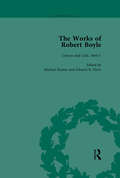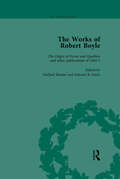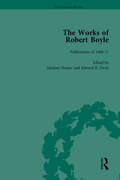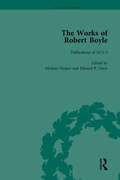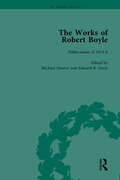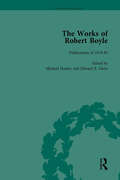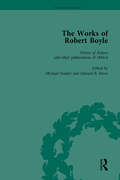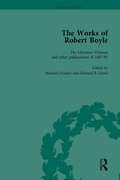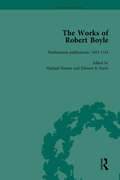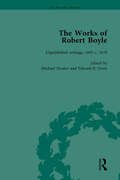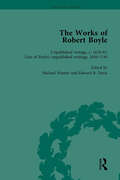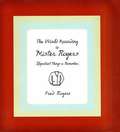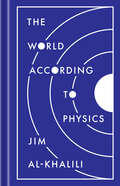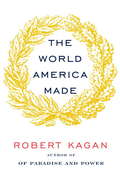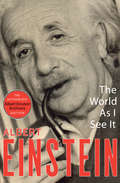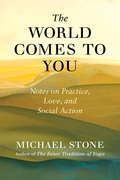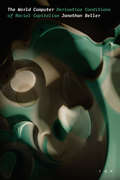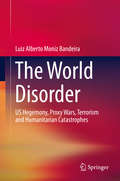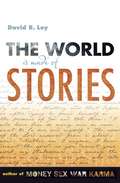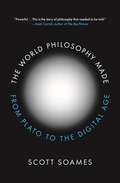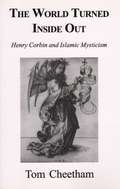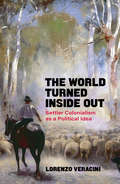- Table View
- List View
The Works of Robert Boyle, Part I Vol 4
by Michael Hunter Edward B DavisIncluding all Robert Boyle's published works, this is the first seven volumes of a 14-volume set. All texts are fully annotated and comprehensively indexed. Works originally in Latin are presented in their contemporary English translations.
The Works of Robert Boyle, Part I Vol 5
by Michael Hunter Edward B DavisIncluding all Robert Boyle's published works, this is the first seven volumes of a 14-volume set. All texts are fully annotated and comprehensively indexed. Works originally in Latin are presented in their contemporary English translations.
The Works of Robert Boyle, Part I Vol 6
by Michael Hunter Edward B DavisIncluding all Robert Boyle's published works, this is the first seven volumes of a 14-volume set. All texts are fully annotated and comprehensively indexed. Works originally in Latin are presented in their contemporary English translations.
The Works of Robert Boyle, Part I Vol 7
by Michael Hunter Edward B DavisIncluding all Robert Boyle's published works, this is the first seven volumes of a 14-volume set. All texts are fully annotated and comprehensively indexed. Works originally in Latin are presented in their contemporary English translations.
The Works of Robert Boyle, Part II Vol 1
by Michael Hunter Edward B DavisIncluding all Robert Boyle's published works, this is the final seven volumes of a 14-volume set. All texts are fully annotated and comprehensively indexed. Works originally in Latin are presented in their contemporary English translations.
The Works of Robert Boyle, Part II Vol 2
by Michael Hunter Edward B DavisIncluding all Robert Boyle's published works, this is the final seven volumes of a 14-volume set. All texts are fully annotated and comprehensively indexed. Works originally in Latin are presented in their contemporary English translations.
The Works of Robert Boyle, Part II Vol 3
by Michael Hunter Edward B DavisIncluding all Robert Boyle's published works, this is the final seven volumes of a 14-volume set. All texts are fully annotated and comprehensively indexed. Works originally in Latin are presented in their contemporary English translations.
The Works of Robert Boyle, Part II Vol 4
by Michael Hunter Edward B DavisIncluding all Robert Boyle's published works, this is the final seven volumes of a 14-volume set. All texts are fully annotated and comprehensively indexed. Works originally in Latin are presented in their contemporary English translations.
The Works of Robert Boyle, Part II Vol 5
by Michael Hunter Edward B DavisIncluding all Robert Boyle's published works, this is the final seven volumes of a 14-volume set. All texts are fully annotated and comprehensively indexed. Works originally in Latin are presented in their contemporary English translations.
The Works of Robert Boyle, Part II Vol 6
by Michael Hunter Edward B DavisIncluding all Robert Boyle's published works, this is the final seven volumes of a 14-volume set. All texts are fully annotated and comprehensively indexed. Works originally in Latin are presented in their contemporary English translations.
The Works of Robert Boyle, Part II Vol 7
by Michael Hunter Edward B DavisIncluding all Robert Boyle's published works, this is the final seven volumes of a 14-volume set. All texts are fully annotated and comprehensively indexed. Works originally in Latin are presented in their contemporary English translations.
The World According to Mister Rogers: Important Things to Remember
by Fred RogersFrom the book: There are few personalities who evoke such universal feelings of warmth as Fred Rogers. An enduring presence in American homes for over 30 years, his plainspoken wisdom continues to guide and comfort many. The World According to Mister Rogers distills the legacy and singular worldview of this beloved American figure. An inspiring collection of stories, anecdotes, and insights--with sections titled Understanding Love, The Courage to Be Yourself, The Challenge of Inner Discipline, and We Are All Neighbors--The World According to Mister Rogers is a testament to the legacy of a man who served and continues to serve as a role model to millions.
The World According to Physics
by Jim Al-KhaliliQuantum physicist, New York Times bestselling author, and BBC host Jim Al-Khalili offers a fascinating and illuminating look at what physics reveals about the worldShining a light on the most profound insights revealed by modern physics, Jim Al-Khalili invites us all to understand what this crucially important science tells us about the universe and the nature of reality itself.Al-Khalili begins by introducing the fundamental concepts of space, time, energy, and matter, and then describes the three pillars of modern physics—quantum theory, relativity, and thermodynamics—showing how all three must come together if we are ever to have a full understanding of reality. Using wonderful examples and thought-provoking analogies, Al-Khalili illuminates the physics of the extreme cosmic and quantum scales, the speculative frontiers of the field, and the physics that underpins our everyday experiences and technologies, bringing the reader up to speed with the biggest ideas in physics in just a few sittings. Physics is revealed as an intrepid human quest for ever more foundational principles that accurately explain the natural world we see around us, an undertaking guided by core values such as honesty and doubt. The knowledge discovered by physics both empowers and humbles us, and still, physics continues to delve valiantly into the unknown.Making even the most enigmatic scientific ideas accessible and captivating, this deeply insightful book illuminates why physics matters to everyone and calls one and all to share in the profound adventure of seeking truth in the world around us.
The World After Gaza: A History
by Pankaj Mishra"Courageous and bracing, learned and ethical, rigorous and mind-expanding.&” —Naomi Klein&“This profoundly important and urgent book finds Mishra, one of our most intellectually astute and courageous writers, at the peak of his powers.&” —Hisham Matar&“A triumphant work of empathy in a polarizing conflict.&” —Anand GiridharadasNamed a Best Book of the Month by TIME • Named a Most Anticipated Book of 2025 by The Guardian, Bustle, Foreign Policy, and Literary Hub From one of our foremost public intellectuals, an essential reckoning with the war in Gaza that reframes our understanding of the ongoing conflict, its historical roots, and the fractured global responseThe postwar global order was in many ways shaped in response to the Holocaust. That event became the benchmark for atrocity, and, in the Western imagination, the paradigmatic genocide. Its memory orients so much of our thinking, and crucially, forms the basic justification for Israel&’s right first to establish itself and then to defend itself. But in many parts of the world, ravaged by other conflicts and experiences of mass slaughter, the Holocaust&’s singularity is not always taken for granted, even when its hideous atrocity is. Outside of the West, Pankaj Mishra argues, the dominant story of the twentieth century is that of decolonization. The World After Gaza takes the current war, and the polarized reaction to it, as the starting point for a broad reevaluation of two competing narratives of the last century: the Global North&’s triumphant account of victory over totalitarianism and the spread of liberal capitalism, and the Global South&’s hopeful vision of racial equality and freedom from colonial rule. At a moment when the world&’s balance of power is shifting, and the Global North no longer commands ultimate authority, it is critically important that we understand how and why the two halves of the world are failing to talk to each other. As old touchstones and landmarks crumble, only a new history with a sharply different emphasis can reorient us to the world and worldviews now emerging into the light. In this concise, powerful, and pointed treatise, Mishra reckons with the fundamental questions posed by our present crisis — about whether some lives matter more than others, how identity is constructed, and what the role of the nation-state ought to be. The World After Gaza is an indispensable moral guide to our past, present, and future.
The World America Made: The Munk Debate On America Foreign Policy (Munk Debates)
by Robert KaganWhat would the world look like if America were to reduce its role as a global leader in order to focus all its energies on solving its problems at home? And is America really in decline? Robert Kagan, New York Times best-selling author and one of the country's most influential strategic thinkers, paints a vivid, alarming picture of what the world might look like if the United States were truly to let its influence wane. Although Kagan asserts that much of the current pessimism is misplaced, he warns that if America were indeed to commit "preemptive superpower suicide," the world would see the return of war among rising nations as they jostle for power; the retreat of democracy around the world as Vladimir Putin's Russia and authoritarian China acquire more clout; and the weakening of the global free-market economy, which the United States created and has supported for more than sixty years. We've seen this before--in the breakdown of the Roman Empire and the collapse of the European order in World War I. Potent, incisive, and engaging, The World America Made is a reminder that the American world order is worth preserving, and America dare not decline.
The World As I See It (Deluxe Hardbound Edition Ser.)
by Albert EinsteinOne of the world&’s greatest minds addresses religion and science, war and peace, and the treatment of minorities in this authorized collection. In the aftermath of the First World War, Albert Einstein writes about his hopes for the League of Nations, his feelings as a German citizen about the growing anti-Semitism and nationalism of his country, and his myriad opinions about the current affairs of his day. In addition to these political perspectives, The World As I See It reveals the idealistic, spiritual, and witty side of this great intellectual as he approaches topics including &“Good and Evil,&” &“Religion and Science,&” &“Active Pacifism,&” &“Christianity and Judaism,&” and &“Minorities.&” Including letters, speeches, articles, and essays written before 1935, this collection offers a complete portrait of Einstein as a humanitarian and as a human being trying to make sense of the changing world around him. This authorized ebook features a new introduction by Neil Berger, PhD, and an illustrated biography of Albert Einstein, which includes rare photos and never-before-seen documents from the Albert Einstein Archives at the Hebrew University of Jerusalem.
The World As I See It (Deluxe Hardbound Edition Ser.)
by Albert EinsteinOne of the world&’s greatest minds addresses religion and science, war and peace, and the treatment of minorities in this authorized collection. In the aftermath of the First World War, Albert Einstein writes about his hopes for the League of Nations, his feelings as a German citizen about the growing anti-Semitism and nationalism of his country, and his myriad opinions about the current affairs of his day. In addition to these political perspectives, The World As I See It reveals the idealistic, spiritual, and witty side of this great intellectual as he approaches topics including &“Good and Evil,&” &“Religion and Science,&” &“Active Pacifism,&” &“Christianity and Judaism,&” and &“Minorities.&” Including letters, speeches, articles, and essays written before 1935, this collection offers a complete portrait of Einstein as a humanitarian and as a human being trying to make sense of the changing world around him. This authorized ebook features a new introduction by Neil Berger, PhD, and an illustrated biography of Albert Einstein, which includes rare photos and never-before-seen documents from the Albert Einstein Archives at the Hebrew University of Jerusalem.
The World Comes to You: Notes on Practice, Love, and Social Action
by Michael StoneShort, potent lessons on living the yoga and Buddhist paths in the midst of everyday life—by teacher Michael Stone.These fresh, intimate teachings by innovative dharma and yoga teacher Michael Stone offer essential wisdom for living with compassion and responsiveness in the midst of everyday life in an imbalanced world.Stone reminds us in a clear and encouraging way that as we turn wholeheartedly toward what is, with our bodies, hearts, and minds, we discover innate resilience and enliven our creative ability to respond. Practice, he shows, is always both internal and external.
The World Computer: Derivative Conditions of Racial Capitalism (Thought in the Act)
by Jonathan BellerIn The World Computer Jonathan Beller forcefully demonstrates that the history of commodification generates information itself. Out of the omnipresent calculus imposed by commodification, information emerges historically as a new money form. Investigating its subsequent financialization of daily life and colonization of semiotics, Beller situates the development of myriad systems for quantifying the value of people, objects, and affects as endemic to racial capitalism and computation. Built on oppression and genocide, capital and its technical result as computation manifest as racial formations, as do the machines and software of social mediation that feed racial capitalism and run on social difference. Algorithms, derived from for-profit management strategies, conscript all forms of expression—language, image, music, communication—into the calculus of capital such that even protest may turn a profit. Computational media function for the purpose of extraction rather than ameliorating global crises, and financialize every expressive act, converting each utterance into a wager. Repairing this ecology of exploitation, Beller contends, requires decolonizing information and money, and the scripting of futures wagered by the cultural legacies and claims of those in struggle.
The World Disorder: US Hegemony, Proxy Wars, Terrorism and Humanitarian Catastrophes
by Luiz Alberto Moniz BandeiraThis book offers a historical analysis of the geopolitical and geoeconomic competition between the USA and Russia, which has recently heated up again due to the eastward expansion of NATO. The analysis departs from an exploration of the USA’s foreign policy and geopolitical ambitions by illustrating the influence of Wall Street and the military-industrial complex on the country’s political decision-making. The historical review covers a wide timespan, from the Second World War and the birth of NATO, to the wars against Iraq and Afghanistan, to the rebellions that erupted in Eurasia, Northern Africa and the Middle East in the 2010’s, as well as the wars in the Ukraine and in Syria. By doing so, it reveals the influence of US neocons, the US intelligence services and the military complex on the Arab Spring, the Color Revolutions and the armed conflicts in Ukraine and Syria. Ultimately, the book depicts a new era of worldwide instability and disorder, dominated by violence and arbitrariness.
The World Is Made of Stories
by David R. LoyIn this dynamic and utterly novel presentation, David Loy explores the fascinating proposition that the stories we tell--about what is and is not possible, about ourselves, about right and wrong, life and death, about the world and everything in it--become the very building blocks of our experience and of reality itself. Loy uses an intriguing mixture of quotations from familiar and less-familiar sources and brief stand-alone micro-essays, engaging the reader in challenging and illuminating dialogue. As we come to see that the world is made--in a word--of stories, we come to a richer understanding of that most elusive of Buddhist ideas: shunyata, the "generative emptiness" that is the all-pervading quality inherent to all mental and physical forms in our ever-changing world. Reminiscent of Zen koans and works of sophisticated poetry, this book will reward both a casual read and deep reflection.
The World Philosophy Made: From Plato to the Digital Age
by Scott SoamesHow philosophy transformed human knowledge and the world we live inPhilosophical investigation is the root of all human knowledge. Developing new concepts, reinterpreting old truths, and reconceptualizing fundamental questions, philosophy has progressed—and driven human progress—for more than two millennia. In short, we live in a world philosophy made. In this concise history of philosophy's world-shaping impact, Scott Soames demonstrates that the modern world—including its science, technology, and politics—simply would not be possible without the accomplishments of philosophy.Firmly rebutting the misconception of philosophy as ivory-tower thinking, Soames traces its essential contributions to fields as diverse as law and logic, psychology and economics, relativity and rational decision theory. Beginning with the giants of ancient Greek philosophy, The World Philosophy Made chronicles the achievements of the great thinkers, from the medieval and early modern eras to the present. It explores how philosophy has shaped our language, science, mathematics, religion, culture, morality, education, and politics, as well as our understanding of ourselves.Philosophy's idea of rational inquiry as the key to theoretical knowledge and practical wisdom has transformed the world in which we live. From the laws that govern society to the digital technology that permeates modern life, philosophy has opened up new possibilities and set us on more productive paths. The World Philosophy Made explains and illuminates as never before the inexhaustible richness of philosophy and its influence on our individual and collective lives.
The World Turned Inside Out
by Tom CheethamAn exploration of the works and ideas of Henry Corbin who introduced the notion of the imaginal to the West as well as explaining the mysticism of the Sufis.
The World Turned Inside Out: Settler Colonialism as a Political Idea
by Lorenzo VeraciniA history and theory of settler colonialism and social controlMany would rather change worlds than change the world. The settlement of communities in 'empty lands' somewhere else has often been proposed as a solution to growing contradictions. While the lands were never empty, sometimes these communities failed miserably, and sometimes they prospered and grew until they became entire countries. Building on a growing body of transnational and interdisciplinary research on the political imaginaries of settler colonialism as a specific mode of domination, this book uncovers and critiques an autonomous, influential, and coherent political tradition - a tradition still relevant today. It follows the ideas and the projects (and the failures) of those who left or planned to leave growing and chaotic cities and challenging and confusing new economic circumstances, those who wanted to protect endangered nationalities, and those who intended to pre-empt forthcoming revolutions of all sorts, including civil and social wars. They displaced, and moved to other islands and continents, beyond the settled regions, to rural districts and to secluded suburbs, to communes and intentional communities, and to cyberspace. This book outlines the global history of a resilient political idea: to seek change somewhere else as an alternative to embracing (or resisting) transformation where one is.
The World Turned Upside Down: Radical Ideas During The English Revolution
by Christopher HillWithin the English revolution of the mid-seventeenth century which resulted in the triumph of the protestant ethic âe" the ideology of the propertied class âe" there threatened another, quite different, revolution. Its success 'might have established communal property, a far wider democracy in political and legal institutions, might have disestablished the state church and rejected the protestant ethic'. In âe~The World Turned Upside Downâe(tm) Christopher Hill studies the beliefs of such radical groups as the Diggers, the Ranters, the Levellers and others, and the social and emotional impulses that gave rise to them. The relations between rich and poor classes, the part played by wandering 'masterless' men, the outbursts of sexual freedom, the great imaginative creations of Milton and Bunyan âe" these and many other elements build up into a marvellously detailed and coherent portrait of this strange, sudden effusion of revolutionary beliefs.
